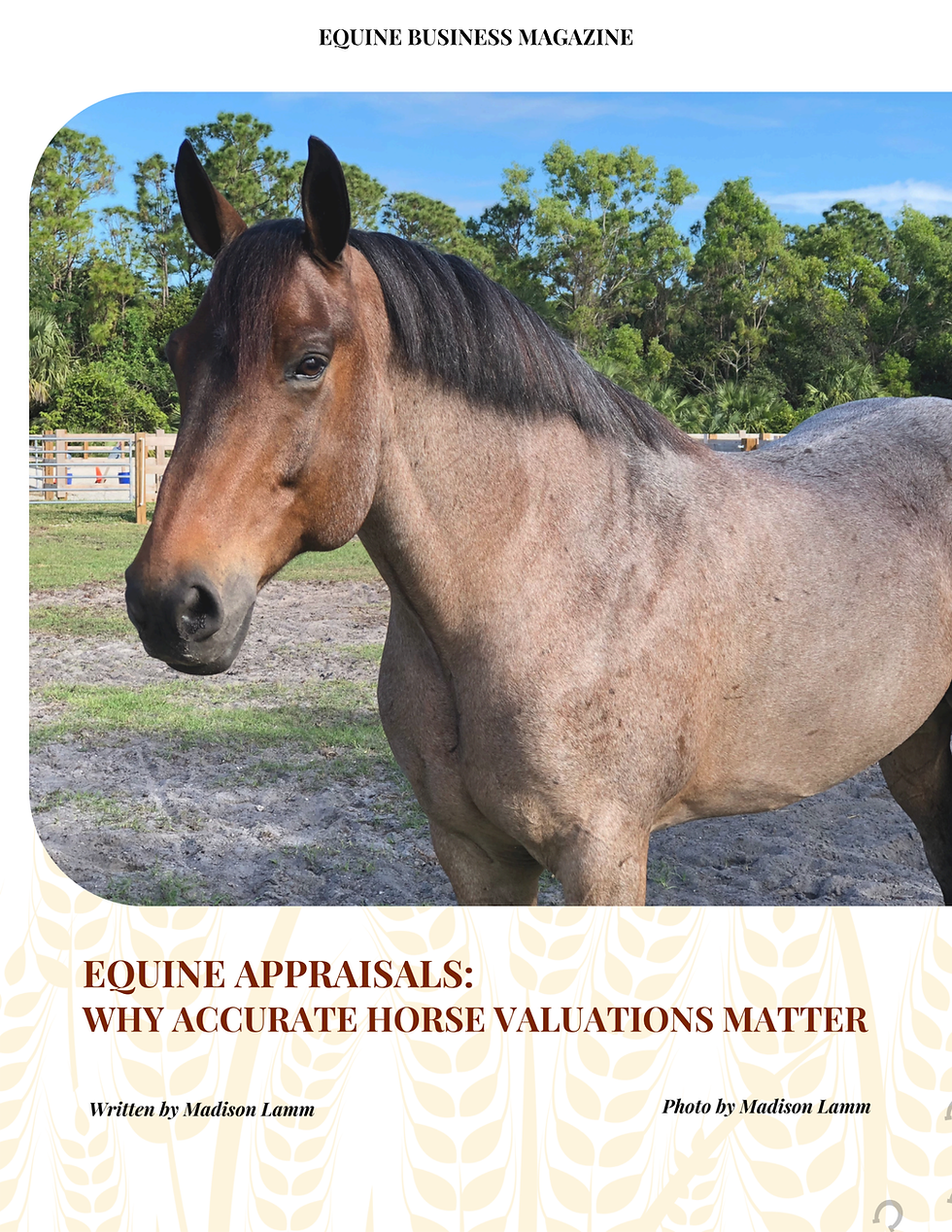Equine Appraisals: Why Accurate Horse Valuations Matter
- Madison Lamm, MEL Equine Appraisals
- Sep 13, 2025
- 3 min read

Whether you're buying, selling, insuring, or settling a legal matter involving horses, knowing their true value is essential.
What Is an Equine Appraisal?
An equine appraisal is a formal process in which a certified appraiser evaluates a horse to determine its value based on objective criteria. These include the horse’s age, breed, training level, pedigree, competition history, condition, and current market trends.
The result is a written report that clearly outlines the appraiser’s findings, comparable sales, and a justifiable valuation. This report may be used in various contexts, including:
Private sales or purchases
Insurance coverage or claims
Divorce, estate, or bankruptcy proceedings
Donation of horses for tax deductions
Business or partnership dissolutions
Litigation or legal disputes
Why Appraisals Are Important
Horses are both emotional and financial investments. Unfortunately, many equine transactions rely on informal estimates or outdated price points, which can lead to disputes, inaccurate tax filings, or financial loss.
A professional appraisal brings credibility, especially when documentation is required. Courts, insurance companies, and the IRS often rely on certified appraisals to resolve disputes or validate asset values.
Here’s what a proper appraisal can provide:
Fairness and transparency in sales and legal matters
Protection against under- or over-insuring
Compliance with legal and tax requirements
Peace of mind for horse owners, buyers, and stakeholders
What the Process Involves
A typical equine appraisal starts with an initial consultation to understand the purpose of the valuation. From there, the appraiser gathers information such as registration papers, veterinary records, show results, and photographs or videos.
When appropriate, an inspection, either physical or via photos/videos, of the horse is conducted to assess its conformation, training level, and overall condition. This is particularly helpful for high-value or performance horses, or when the appraisal may be used in a legal context.
The appraiser then analyzes comparable sales and current market conditions to determine a fair market value. The final report outlines the findings in a clear, professional format that can be used for legal, insurance, or business purposes.
Choosing the Right Appraiser
Not all appraisers are equally qualified. When selecting someone to assess your horse, it’s important to look for:
Certification from a recognized organization (such as ASEA or ASA)
Experience in the equine industry and familiarity with your horse’s discipline or market
Objectivity and professionalism in preparing thorough, defensible reports
A quality appraisal goes beyond just assigning a number — it provides a transparent process you can trust.
When to Consider an Appraisal
Many people assume they only need an appraisal when a problem arises, but there are many proactive reasons to get one. Consider an equine appraisal if you are:
Selling or buying a horse and want a fair market reference
Donating a horse and need IRS-compliant documentation
Creating or dissolving an equine business partnership
Filing an insurance claim due to injury, theft, or loss
Involved in a divorce or estate division that includes horses
Even if you're simply curious about your horse’s current market value, a professional appraisal offers valuable insight.
Final Thoughts
Equine appraisals provide more than just numbers — they offer confidence, documentation, and protection in a complex and emotionally charged industry. With horses representing both financial value and personal significance, it's worth taking the time to understand their true worth.
If you're navigating a transaction, legal matter, or insurance claim involving a horse, working with a certified equine appraiser can help you move forward with clarity and assurance.
Let’s Talk
Appraising a horse is both an art and a science — and I bring both to the table. With deep industry knowledge, rigorous standards, and a client-centered approach, I’m here to provide you with equine appraisals you can trust.
If you’re ready to get started — or just have questions — I’m happy to talk through your situation and explain how I can help. Reach out today to schedule a free consultation.

Contact Me:
Madison Lamm
ASEA Certified Equine Appraiser
561-319-2625
This article is from the September issue of Equine Business Magazine







Comments